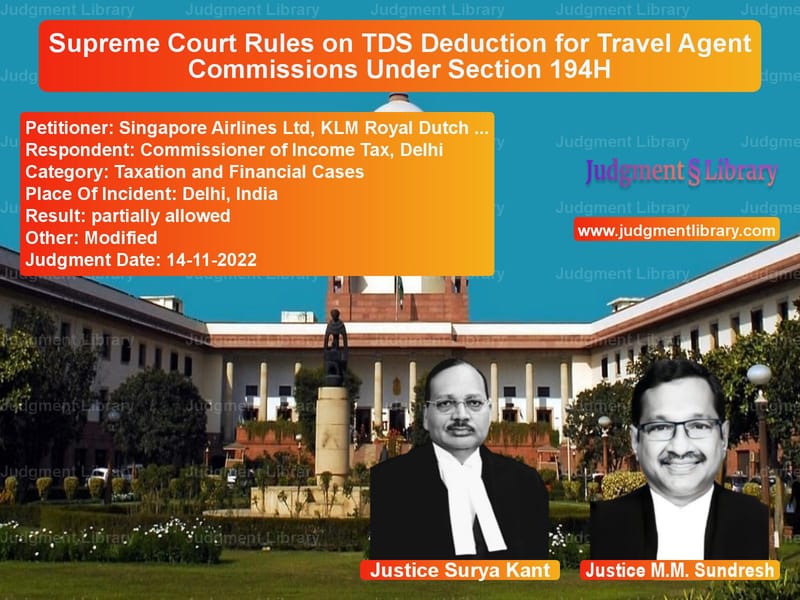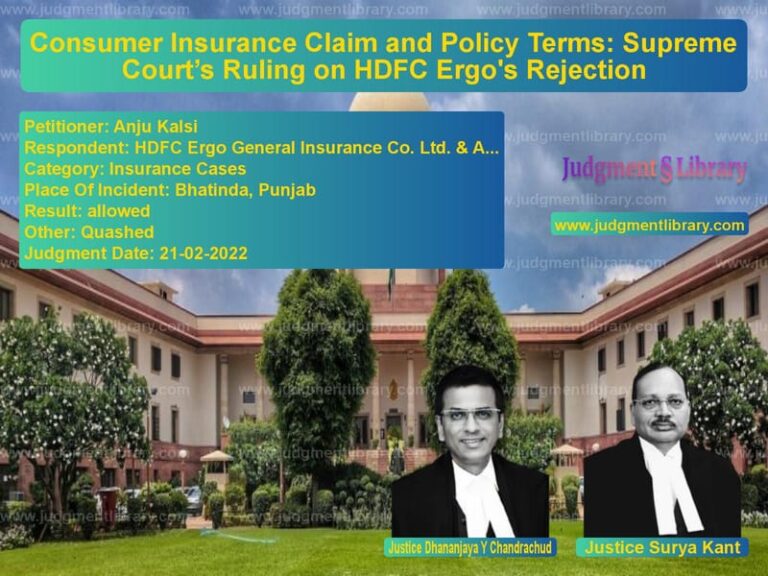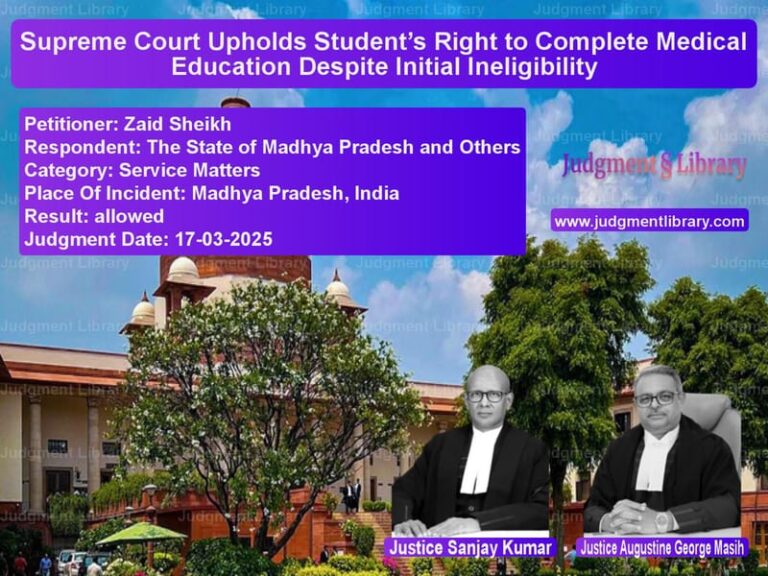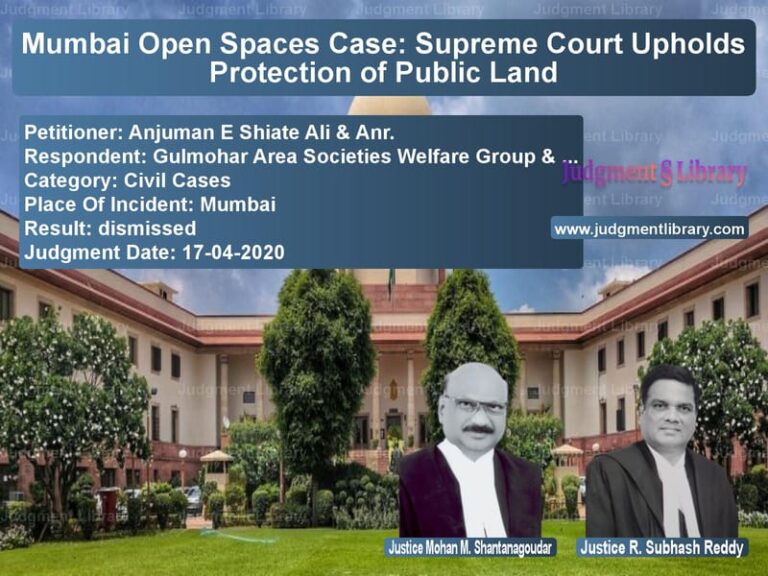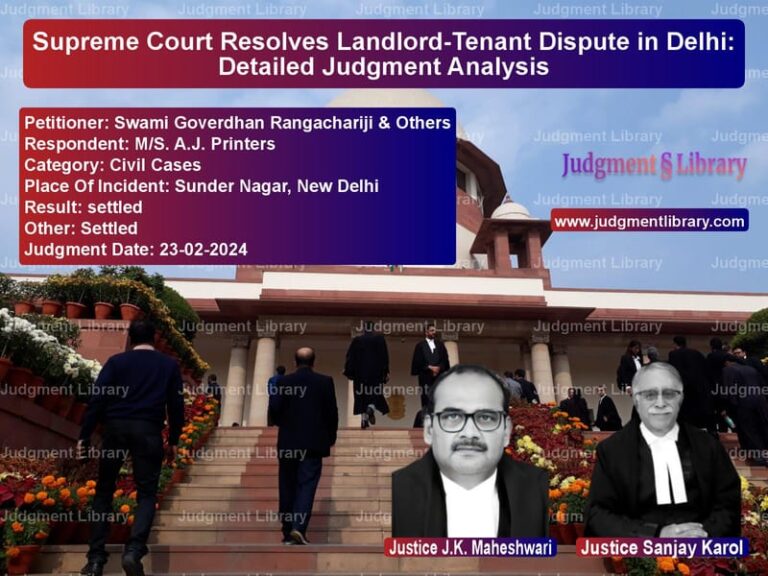Supreme Court Rules on TDS Deduction for Travel Agent Commissions Under Section 194H
The Supreme Court of India has delivered a significant ruling regarding the deduction of tax at source (TDS) on commissions earned by travel agents from airlines under Section 194H of the Income Tax Act, 1961. The case involved major international airlines—Singapore Airlines, KLM Royal Dutch Airlines, and British Airways—challenging the tax authorities’ demand to deduct TDS on supplementary commissions earned by travel agents.
Background of the Case
The dispute arose from the earnings of travel agents beyond the ‘Standard Commission’ paid by airlines. The airlines argued that the extra amount earned by agents was not a payment from the airlines but rather an independent margin added by the agents when selling tickets to customers. The Income Tax Department contended that since these earnings were based on airline ticket sales, they were indirectly derived from the airline and should be subject to TDS.
Petitioner’s Arguments (Airlines)
- The airlines contended that the additional earnings made by agents over and above the base fare were not ‘income’ paid by the airlines.
- They emphasized that they only paid a fixed commission (Standard Commission) and had no control over the price at which agents sold tickets.
- Their records only reflected the net fare remitted by agents, and they had no means to determine the final sale price of a ticket.
- The travel agents were already declaring their earnings and paying taxes on them, rendering additional TDS redundant.
Respondent’s Arguments (Income Tax Department)
- The Income Tax Department asserted that travel agents function as intermediaries for airlines, making them ‘agents’ under Section 194H.
- It argued that any earnings derived from the airline business, whether explicitly paid by the airline or not, must be considered as commission income subject to TDS.
- The BSP (Billing and Settlement Plan) system allowed airlines to access ticket sales data, proving that airlines had the means to determine commissions earned by agents.
- Failure to deduct TDS on such earnings would allow tax evasion.
Key Observations of the Supreme Court
The Supreme Court examined the nature of travel agent commissions and the applicability of Section 194H:
- The Passenger Sales Agency Agreements (PSA) between airlines and travel agents established a clear principal-agent relationship.
- The additional earnings of travel agents arose solely due to their arrangement with the airlines, making it subject to TDS.
- The BSP system allowed airlines to track and verify commissions earned by agents, making TDS deduction feasible.
- Allowing airlines to avoid TDS deductions would create a loophole in tax laws.
In its ruling, the Court stated:
“The commission earned by travel agents beyond the net fare remains an integral part of the airline-agent transaction, and is therefore liable for tax deduction under Section 194H.”
Final Judgment
The Supreme Court ruled that:
- Supplementary Commission earned by travel agents is taxable under Section 194H.
- Airlines must deduct TDS at the time of crediting or paying commission to travel agents.
- No additional tax recovery was required since travel agents had already declared and paid taxes on these earnings.
- Airlines were liable for interest under Section 201(1A) for delayed TDS deductions.
- Penalty proceedings under Section 271C were dismissed as the issue was subject to legal interpretation.
Implications of the Judgment
- Clarification of TDS Applicability: The ruling affirms that commissions, whether explicitly paid by airlines or indirectly earned by agents, fall under TDS obligations.
- Compliance Obligations for Airlines: Airlines must monitor travel agent earnings through the BSP system and ensure TDS deductions are made.
- Tax Evasion Prevention: The ruling prevents potential revenue loss by enforcing compliance with tax regulations.
Conclusion
The Supreme Court’s decision establishes a definitive precedent in taxation within the airline industry. By clarifying the interpretation of Section 194H, the ruling ensures compliance with TDS laws while protecting the interests of travel agents, airlines, and tax authorities. Moving forward, airlines must incorporate TDS deductions into their financial operations to align with the legal framework.
Petitioner Name: Singapore Airlines Ltd, KLM Royal Dutch Airlines, British Airways PLC.Respondent Name: Commissioner of Income Tax, Delhi.Judgment By: Justice Surya Kant, Justice M.M. Sundresh.Place Of Incident: Delhi, India.Judgment Date: 14-11-2022.
Don’t miss out on the full details! Download the complete judgment in PDF format below and gain valuable insights instantly!
Download Judgment: singapore-airlines-l-vs-commissioner-of-inco-supreme-court-of-india-judgment-dated-14-11-2022.pdf
Directly Download Judgment: Directly download this Judgment
See all petitions in Income Tax Disputes
See all petitions in Tax Evasion Cases
See all petitions in Banking Regulations
See all petitions in Tax Refund Disputes
See all petitions in GST Law
See all petitions in Judgment by Surya Kant
See all petitions in Judgment by M.M. Sundresh
See all petitions in partially allowed
See all petitions in Modified
See all petitions in supreme court of India judgments November 2022
See all petitions in 2022 judgments
See all posts in Taxation and Financial Cases Category
See all allowed petitions in Taxation and Financial Cases Category
See all Dismissed petitions in Taxation and Financial Cases Category
See all partially allowed petitions in Taxation and Financial Cases Category

